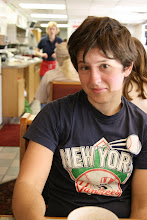 In her book about the queer experience of grief and loss, Feeling Backward, Heather Love refers to the anomaly of simultaneous disconnection from one's past and incredible longing for identification as "a willingness to be haunted." I've been thinking about this-- about how I've never seen a ghost but want to. What is that desire?
In her book about the queer experience of grief and loss, Feeling Backward, Heather Love refers to the anomaly of simultaneous disconnection from one's past and incredible longing for identification as "a willingness to be haunted." I've been thinking about this-- about how I've never seen a ghost but want to. What is that desire?I'm also reading a book from 1967 called Famous Ghosts, Phantoms, and Poltergeists for the Millions by Andrew Tackberry. I'd like to share the beginning of it's wonderful introduction:
"What is a ghost? The answer to this question frequently depends upon who is asked it. To most people a ghost is the stuff from which stories are written, the floating, white-clad, luminous form that is seen in deserted houses or in midnight graveyards moaning out messages of terror to the unsuspecting living. To others a ghost is the substance of dreams, appearing at the edge of sleep as the face of a loved one, long gone and almost forgotten, or as the night-mare symbol of all his guilt and his fears. The child thinks of a ghost as bringing delightful shivers in stories while the scientist considers the word "ghost" as being the collective term for all of the superstitious rubbish and use-less myth of past ages.
A ghost? Why, a ghost is many things to many people, its nature depending upon the strength of their imaginations. But in this day and age it would be easier to say what a ghost is not. In the Age of Science, a ghost is not real. A ghost does not exist, and never did. A ghost, according to the average enlightened adult has no reality, but is merely the product of the credulous and fanciful mind."

No comments:
Post a Comment